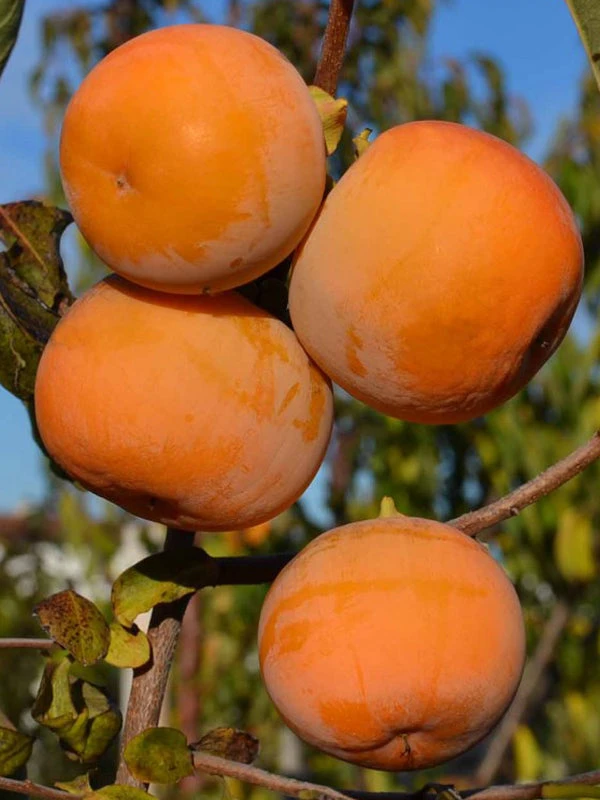Where Asian delicacy meets American resilience in one extraordinary fruit tree

The Persimmon Paradox: Why Northern Gardeners Couldn’t Have It All… Until Now
For decades, temperate zone fruit enthusiasts faced an impossible choice: settle for the small, seedy native persimmons that could survive northern winters, or pine for the luscious Asian varieties that remained tantalizingly out of reach. The Rosseyanka persimmon tree shatters this compromise with its groundbreaking genetics – delivering the candy-like sweetness of Japanese Kaki persimmons on a cold-hardy American frame.
“I’d given up on growing persimmons in Michigan until I discovered Rosseyanka. The first time I tasted one, I couldn’t believe something this tropical could grow in our climate!” – Mark T., Zone 6 gardener
The Science Behind the Sweetness: A Three-Level Deconstruction
Physical Architecture
- Tree Form: 15-20′ height with American persimmon branching structure
- Fruit Morphology: 2-3″ diameter (50% larger than native varieties)
- Leaf Characteristics: Classic American foliage with exceptional orange fall color
- Grafting: On native rootstock for enhanced cold tolerance
Flavor Chemistry
- Sweetness Profile: 18-22° Brix (comparable to premium Asian varieties)
- Tannin Management: Astringency disappears completely when soft-ripe
- Seedlessness: No hard seeds interrupting the smooth texture
- Storage Sugars: Flavor intensifies with winter storage
Ecological Advantage
- Cold Hardiness: USDA Zones 5-8 (-20°F tolerance)
- Disease Resistance: Inherited American parent resilience
- Phenology: Late bloom avoids spring frost damage
- Fruit Retention: Hangs well into winter for extended harvest
The Hybrid Advantage: Rosseyanka vs. Traditional Varieties
| Feature | Native American | Asian Kaki | Rosseyanka |
|---|---|---|---|
| Cold Tolerance | Excellent (to Zone 4) | Poor (Zone 7+) | Very Good (Zone 5) |
| Fruit Size | Small (1-2″) | Large (3-4″) | Medium (2-3″) |
| Flavor Profile | Subtle, earthy | Intensely sweet | Complex blend |
| Seed Content | Multiple seeds | Variable | Seedless |
| Year-Round Value | Fall interest only | Fruit focus | Four-season appeal |
Story Value
Unlike single-purpose fruit trees, Rosseyanka becomes a character in your garden’s annual narrative – from spring blossoms to winter fruit harvests, each phase offering new delights and learning opportunities.
Emotional Dividend
The pride of growing “impossible” fruit creates deeper gardener-plant bonds than conventional varieties, while the extended harvest season provides ongoing moments of wonder during typically barren months.
From Frustration to Fulfillment: The Rosseyanka Transformation
Initial State
Zone 5-7 gardeners reluctantly accept limited persimmon options, believing premium flavor requires tropical climates
Trigger Event
First encounter with high-quality Asian persimmons creates lasting craving, while failed attempts to grow them breed frustration
Struggle Phase
Wasted years on marginal solutions: greenhouse attempts, unreliable mail-order fruit, or settling for inferior native varieties
Rosseyanka Solution
Hybrid genetics deliver 80% of premium flavor with 200% more reliability, turning impossibility into abundant harvests
New Reality
December harvests become routine, with homegrown persimmons elevating holiday meals and surprising guests
Wisdom Gained
Recognizing that plant breeding breakthroughs can solve climate limitations without compromising quality
Why Rosseyanka Persimmon Trees Are Revolutionizing Northern Orchards
For gardeners in USDA Zones 5-8 seeking cold hardy fruit trees with exceptional flavor, the Rosseyanka persimmon represents a quantum leap forward. This innovative hybrid persimmon tree combines the best traits of its parentage:
- American Persimmon Toughness: Inheriting winter hardiness from native persimmon rootstock, Rosseyanka withstands temperatures that would kill Asian varieties
- Kaki Persimmon Flavor: The seedless persimmon fruit develops a complex sweetness reminiscent of premium Japanese cultivars
- Four-Season Interest: From spring blossoms to fall leaf color and winter fruit persistence, it outperforms ordinary fruit trees for cold climates
The astringent persimmon variety requires no special treatment – simply allow fruits to soften completely (indicated by characteristic wrinkling) for sweet persimmon flavor without tannic bite. Unlike fussy tropical fruit trees, Rosseyanka thrives with basic care while producing large persimmons perfect for fresh eating, drying, or baking.
The Emotional Payoff of Growing Rosseyanka
Beyond practical advantages, this hardy persimmon tree delivers intangible rewards that explain its passionate following:
Pride of Place
As a conversation-starting unique fruit tree, Rosseyanka becomes the showpiece of your edible landscape, proving sophisticated flavors can thrive in challenging climates.
Seasonal Connection
The extended harvest window – often stretching into winter solstice – creates meaningful rituals around gathering and sharing the precious fruit.
Legacy Potential
With proper care, these grafted persimmon trees can outlive their planters, becoming multigenerational assets that tell your family’s horticultural story.
The Rosseyanka Difference: More Than Just a Fruit Tree
In a world of compromise, the Rosseyanka persimmon tree stands as a rare exception – a plant that actually delivers on the promise of “having it all.” By bridging continental divides in its genetics, it offers northern gardeners unprecedented access to premium persimmon flavor without greenhouse coddling or flavor sacrifices. Whether you’re a permaculture enthusiast seeking resilient food sources, a gourmet gardener chasing exceptional flavors, or simply someone who appreciates four-season beauty, this remarkable hybrid deserves a place in your landscape.
Your journey to winter sweetness begins with one tree – start growing your Rosseyanka legacy today.
